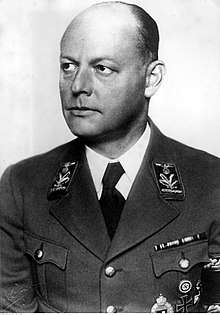Erich Hilgenfeldt
Georg Paul Erich Hilgenfeldt (born 2 July 1897 in Heinitz/Ottweiler; likely died in April/May 1945 in Berlin) was a high Nazi Party government official.
Erich Hilgenfeldt | |
|---|---|
 | |
| Leader of the National Socialist People's Welfare | |
| In office 20 April 1931 – May 1945 | |
| Appointed by | Joseph Goebbels |
| Reich Commissioner for the Winterhilfswerk | |
| In office 21 September 1933 – May 1945 | |
| Personal details | |
| Born | 2 July 1897 Heinitz/Ottweiler |
| Died | 25 April 1945 (aged 47) Likely in Berlin |
| Political party | Nazi Party |
| Spouse(s) | Marie-Charlotte Köhler
( m. 1922; div. 1940)Leopoldine Statischek
( m. 1940; died 1945) |
| Children | 2 |
| Military service | |
| Allegiance | |
| Branch/service | |
| Rank | SS–Gruppenführer |
| Awards | Danzig Cross |
Life
Early life and education
Hilgenfeldt was born on 2 July 1897 in Heinitz.[1] He went to the Oberrealschule in Saarbrücken, whereafter he went to Halle until Obersekunda (roughly Grade or Year 11) on the "Frankesch" endowment.
Personal life
Married on 24. April 1922 to Marie-Charlotte Köhler, they separated around 1935 and finally divorced 30 November 1940. They had two children together, Reinhard (2 March 1923 – killed in action 2 November 1943 at the Trigno River area 1 km south of Tufillo/Italy) and another boy (1 October 1927). Hildgenfeldt then remarried on 6 December 1940 to Leopoldine Statischek (23 September 1907 at Novi Sad/Serbia – suicide by poison ? April/May 1945 at Berlin) from Wien.
World War I service and employment
Hilgenfeldt served in the First World War as an officer and pilot.[2][3] After school, he was first an office staffer in the timber industry and head of sales for a building business. From 1928, Hilgenfeldt was a staffer at the Reich Statistical Office.[1]
Nazi Party service
On 1 August 1929, Hilgenfeldt became an NSDAP member (no. 143642), and by 1932 he had become NSDAP Kreisleiter (District Leader) and by 1933 NSDAP Gauinspektor for Inspektion I Groß-Berlin. By 1931 he was a municipal councillor for Berlin-Welmersdorf.[4]
Hilgenfeldt worked as office head at the NSDAP Office for People's Welfare and in close association with the Nationalsozialistische Volkswohlfahrt (NSV), or the National Socialist People's Welfare. By organizing a charity drive to celebrate Hitler's Birthday on 20 April 1931, Joseph Goebbels named him the head of the NSV. The NSV was named the single Nazi Party welfare organ in May 1933.[3] On 21 September 1933 he was appointed as Reich Commissioner for the Winterhilfswerk (Winter Support Programme). Under Hilgenfeldt the programme was massively expanded, so that the régime deemed it worthy to be called the "greatest social institution in the world." One method of expansion was to absorb, or in NSDAP parlance coordinate, already existing but non-Nazi charity organizations. NSV was the second largest Nazi group organization by 1939, second only to the German Labor Front.[3][4]
From November of the same year, Hilgenfeldt was a member of the Reich Work Chamber (Reichsarbeitskammer), as well as the Academy for German Law and Honorary Judge at the Supreme Honour and Disciplinary Court. As NSV leader, he was also Reich Women's Leader (Reichsfrauenführerin) Gertrud Scholtz-Klink's superior.[5] Also by virtue of his NSV office, he was the head of the German union of private charitable organizations, which included among its members the Protestant Inner Mission organization and the Catholic Caritas, as well as the NSV itself.[6] From 1933, he also served in the Prussian Landtag as well as being a member of the Reichstag.[1]
Hilgenfeldt spoke at the Nuremberg Party Rally in 1936, during the Third Session of the Party Conference.[7]
On 9 September 1937, Hilgenfeldt became SS member no. 289225, and then in 1939 a Brigadeführer in the Waffen-SS, and moreover a Main Office Leader.
In the course of Hilgenfeldt's career, he was not only made an honorary judge, but also appointed Chairman of the Reich Association for Offender Support (Reichsverband für Straffälligenbetreuung). Furthermore, he was also awarded the Danziger Kreuz, First Class. He ultimately reached the rank of Gruppenführer.
Death
Hilgenfeldt went missing in May 1945. He is thought to have committed suicide in Berlin, but the circumstances of his death are still unclear.
Hilgenfeldt had a sister named Hedwig who officially declared Erich and his wife Leopoldine dead at the register's office in Berlin-Charlottenburg, in 1957.
Notes
- Grill Nazi Movement in Baden p. 623
- Evans The Third Reich in Power p. 488
- Burleigh The Third Reich p. 219-223
- Burleigh Racial State p. 68
- Koonz Mothers in the Fatherland p. 167
- Grill Nazi Movement in Baden p. 369
- The Nuremberg Party Rally of Honor 1936 accessed 16 July 2007
References
- Burleigh, Michael; Wippermann, Wolfgang (1991). The Racial State: Germany, 1933–1945. Cambridge, UK: Cambridge University Press. ISBN 0-521-39114-8.
- Burleigh, Michael (2000). The Third Reich: A New History. New York: Hill and Wang. ISBN 0-8090-9326-X.
- Evans, Richard J. (2005). The Third Reich in Power. New York: Penguin. ISBN 978-1-59420-074-8.
- Grill, Johnpeter Horst (1983). The Nazi Movement in Baden, 1920–1945. Chapel Hill, NC: University of North Carolina Press. ISBN 0-8078-1472-5.
- Koonz, Claudia (1987). Mothers in the Fatherland: Women, the Family and Nazi Politics. New York: St. Martin's Press. ISBN 0-312-02256-5.
- The Party Roll of Honor 1936 accessed 27 June 2007
Further reading
- Hermann Weiß (Herausgeber) (2003). Personenlexikon 1933–1945. Vienna: Tosa. p. S. 209. ISBN 3-85492-756-8.
External links
- Erich Hilgenfeldt in the German National Library catalogue
- Newsletter Behindertenpolitik (in German)
- Newspaper clippings about Erich Hilgenfeldt in the 20th Century Press Archives of the ZBW